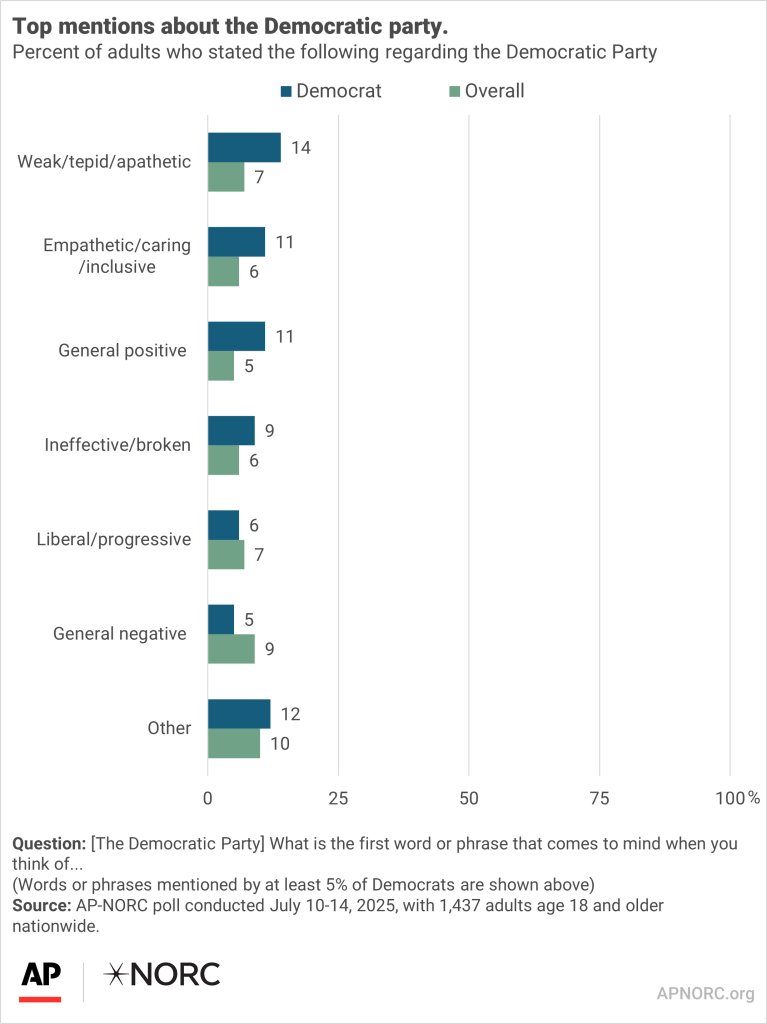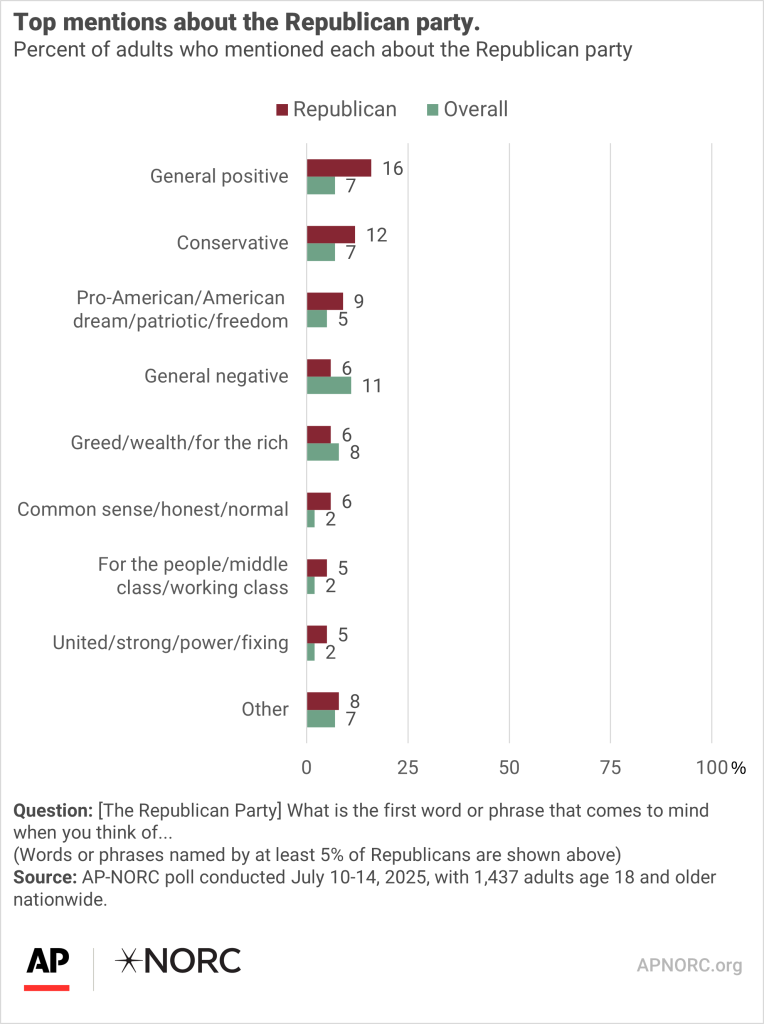
August 3, 2025
Democrats are less enthusiastic about their own party than Republicans. About a third of Democrats describe their party in starkly negative terms and a quarter use positive attributes. In contrast, twice as many Republicans describe their party positively than negatively.
The latest AP-NORC poll asked respondents to share the first word or phrase that comes to mind when they think of each political party.
Thirty-five percent of Democrats ascribe a negative attribute to their party. Fourteen percent describe it as weak or tepid, 9% say it is broken or ineffective, 5% offer generally negative comments, and fewer than 5% describe it as dishonest, corrupt, or out of touch.
Fewer, 23%, of Democrats cite a positive attribute of their party. Eleven percent describe it as empathetic or inclusive, another 11% offer general positive remarks, and 1% mention values like freedom.
Besides describing their party in purely positive or negative terms, 7% mentioned the party’s ideology – 6% with terms like liberal or progressive and 1% saying too extreme or woke. About 1 in 10 Democrats referenced specific policy positions. Three percent mentioned support for the middle class or poor, another 3% cited welfare or entitlement programs, 2% referred to DEI, race, or LGBTQ+ rights, 1% mentioned big government, and less than 1% brought up immigration.

In contrast, relatively few Republicans express dissatisfaction with their party—only 19% mention a negative aspect while 41% use a positive word or phrase.
Among Republicans who cite negative aspects of their party, 6% offer general criticisms, another 6% say it represents the interests of the wealthy or is greedy, 3% describe it as dishonest or corrupt, and 1% each say it is dumb or stupid, self-centered or selfish, sycophantic, or ineffective or disorganized. Less than 1% describe it as mean or rude.
Of the 41% of Republicans who described their party positively, 16% offered general praise, 9% said it is pro-American, 6% cited common sense or normalcy, 5% described it as united or strong, and another 5% said it represents the people or the middle class.
Besides describing their party in purely positive or negative terms, 13% mentioned the party’s ideology – 12% with terms like conservative and 1% saying too extreme. About 2% of Republicans referenced specific policy positions, the primary position being support for capitalism.

Overall, adults are more likely to use negative attributes to describe either party. Thirty-nine percent use negative words or phrases to describe the Democratic Party, while 43% do the same about the Republican party.
Of the 39% who describe the Democratic Party negatively, 10% say it is dishonest, 9% offer generally negative comments, 7% call it weak or tepid, 6% say it is ineffective, 3% describe it as crazy or out of touch, 2% say it is stupid or moronic, and about 1% label it as evil or malicious.
Of those who offer negative comments about the Republican Party, 11% provide generally negative remarks, 8% say it is greedy or represents the interests of the wealthy, 8% describe it as dishonest, 5% call it evil or malicious, 4% say it is racist, and about 2% each say it is ineffective, dumb or irrational, self-centered or selfish, or sycophantic.
In contrast, 11% describe the Democratic Party positively, while 18% do the same for the Republican Party.
Democrats tend to describe the Republican Party in strongly negative terms: 12% cite dishonesty or corruption, another 12% mention greed or favoring the wealthy, 10% mention terms such as mean or malicious, and 7% label it as racist.
Republicans view the Democratic Party in similarly critical terms: 14% mention dishonesty or corruption, 11% refer to ideological extremes, 6% say crazy or out of touch, and 5% say the Democratic party is ineffective or disorganized.
The nationwide poll was conducted July 10-14, 2025 using the AmeriSpeak® Panel, the probability-based panel of NORC at the University of Chicago. Online and telephone interviews using landlines and cell phones were conducted with 1,437 adults. The overall margin of sampling error is +/- 3.6 percentage points. Respondents age 18-29 were sampled at a higher rate than their proportion of the population for reasons of analysis. The overall margin of sampling error for the 386 interviews completed with respondents age 18-29 is +/- 6.6 percentage points.
- Suggested Citation: AP-NORC Center for Public Affairs Research. “Republicans remain positive about their party; Democrats are more self-critical.” (July 2025). https://apnorc.org/projects/republicans-remain-positive-about-their-party-democrats-are-more-self-critical/







